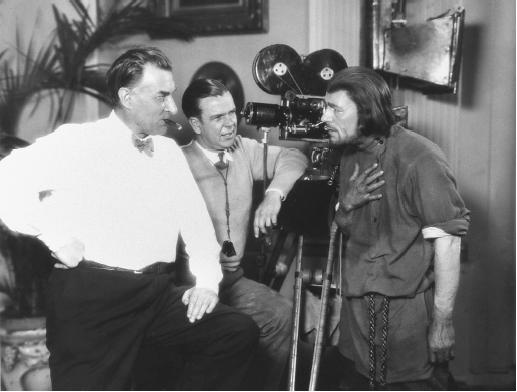Benjamin Christensen - Director
Nationality: Danish. Born: Viborg, Denmark, 28 September 1879. Education: Educated in medicine; entered dramatic school of the Royal Theatre, Copenhagen, 1901. Family: Married 1) Ellen Arctander in 1904; 2) Sigrid Stahl in 1922; 3) Kamma Winther in 1927. Career: Actor in Aarhus Theatre (Jutland), then Folkteatret, Copenhagen, to 1907; left stage, became agent for French champagne firm Lanson, 1907; began as film actor, 1912; directed first film, 1913; went to Germany, worked for Erich Pommer, 1923; worked in United States, 1926–34; returned to Denmark and, in 1939, went to work for Nordisk Films Kompagni; left film production, 1942, and became manager of a movie theater. Died: 2 April 1959.
Films as Director:
- 1913
-
Det hemmelighedsfulde X ( The Mysterious X ) (+ role)
- 1915
-
Haevnens Nat ( Blind Justice ) (+ role)
- 1922
-
Häxan ( Witchcraft through the Ages ) (+ sc, role as Devil and doctor)
- 1923
-
Seine Frau, die Unbekannte ( His Mysterious Adventure )
- 1924
-
Die Frau mit dem schlechten Ruf ( The Woman Who Did ) (not completed)
- 1926
-
The Devil's Circus
- 1927
-
Mockery
- 1928
-
Hawk's Nest ; The Haunted House ; House of Horror
- 1929
-
Seven Footprints to Satan
- 1939
-
Skilsmissens Brní
- 1940
-
Barnet
- 1941
-
Gaa med mig hjem
- 1942
-
Damen med de lyse handsker
Other Films:
- 1912
-
Skaebnebaeltet (role)
- 1913
-
Gidslet (role); Scenens Brní (role); Store Klaus og Lille Klaus (role); Rumaensk Blod or Sstreneí Corrodi (role); Vingeskudt (role)
- 1924
-
Michael (role)
Publications
By CHRISTENSEN: book—
Hollywood Skaebner (short stories), 1945.
On CHRISTENSEN: book—
Ernst, John, Benjamin Christensen , Copenhagen, 1967.
On CHRISTENSEN: articles—
Gillett, John, "The Mysterious X," in Sight and Sound (London), Spring 1966.
Higham, Charles, "Christensen Continued," in Sight and Sound (London), Autumn 1966.
Tessier, Max, "La Sorcellerie à travers les âges," in Cinéma (Paris), no. 130, 1968.
Routt, W.D., "Buried Directors," in Focus on Film (London), Spring 1972.
* * *
Benjamin Christensen's first film was one of the most amazing directorial debuts in the history of film. Det hemmelighedsfulde X is a spy melodrama about a lieutenant accused of betraying his country, but who is saved at the last minute. If the story is conventional, the handling of it shows a natural instinct for film that is way ahead of its

Benjamin Christensen provoked his contemporaries and set himself in opposition to the filmmaking practices of his time. He had a strong belief in himself and worked consciously with film as a new art form. He considered the director as the author of the film and stated that "like any other artist he should reveal his own individuality in his own work." Thus Christensen can be regarded as one of the first auteurs of the cinema. Carl Dreyer characterized Christensen as "a man who knew exactly what he wanted and who pursued his goal with uncompromising stubbornness." Christensen's main work is Häxan , an ambitious and unique film and a pioneering achievement in both the documentary and the fiction film. In this film Christensen combined his rationalistic ideas with his passionate temperament.
Christensen was always an isolated director in the Danish film world, and after Häxan he left Denmark. He made an insignificant film in Germany and was seen in Dreyer's Michael as the master. He got an offer from Hollywood and made six films there. He used his talent for the strange and peculiar Seven Footprints to Satan , a witty horror comedy. Christensen returned to Denmark in the 1930s and in 1939 he was hired by Nordisk Films Kompagni. Again Christensen showed himself to be a controversial filmmaker. Determined to break the trivial pattern of Danish cinema at that time, he made three films which dealt with topical problems arising from conflicts between generations. One film depicted children from divorce-ridden homes, another was about abortion. Christensen's last film was a spy thriller set against an international setting. It was a total failure, and Christensen left film production. For the rest of his life he lived in splendid isolation as manager of a small and insignificant cinema in the suburbs of Copenhagen.
—Ib Monty
Comment about this article, ask questions, or add new information about this topic: